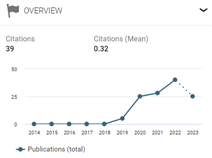Perkembangan kondisi pasien sindrom nefrotik anak setelah pemberian asuhan gizi di Rumah Sakit Umum Dr. Moch. Shaleh Probolinggo
DOI: 10.30867/gikes.v5i2.1517Abstract
Background: Nefrotik syndrome (NS) is the most common kidney disorder found in children with an incidence rate of up to 15 times more than in adults. Clinical conditions due to disease progression and the effects of NS treatment require adjustments in terms of diet, so it requires a proper diet to suppress disease progression and improve the quality of life of patients.
Objectives: The aim of this study is to determine the effect of nutritional care on the development of the condition of pediatric NS patients.
Methods: This study is a case report of nutritional care of NS patients for 3 days. The study was conducted at Dr. Mohamad Saleh Probolinggo Regional Public Hospital. The subjects in this study was adolescents aged 17 years and 10 months with NS. The data obtained are tabulated and analyzed descriptively.
Results: After providing nutritional care for 3 days, it was seen that the nutritional status of patients before and after the intervention was classified as good nutritional status, the patient's albumin levels increased from 2,2 mg/dL to 3,3 mg/dL. The patient's physical condition showed a reduction in edema in the feet and hands. The average energy intake has met the adequacy of intake which is 82,5%, 85,7% and 92,57 %.
Conclusion: Nutritional care produces a positive influence on NS patients at Dr. Moch Shaleh Probolinggo Regional Public Hospital. Providing education to patients and patients' families by nutritionists needs to be done regularly so that patients have the motivation to run a given diet properly.
Keywords
Nefrotik Syndrome, nutritional status, nutritional care, disease progression
Keywords
Full Text:
PDFReferences
Agrawal, S., Zaritsky, J. J., Fornoni, A., & Smoyer, W. E. (2017). Dyslipidaemia in nefrotik syndrome: Mechanisms and treatment. In Nature Reviews Nephrology (Vol. 14, Issue 1, pp. 57–70). https://doi.org/10.1038/nrneph.2017.155
Amalia, T. Q. (2018). Aspek klinis, diagnosis dan tatalaksana sindroma nefrotik pada anak. Jurnal Kedokteran Nanggroe Medika, 1(2), 81–88.
Andolino, T. P., & Reidadam, J. (2015). Nefrotik syndrome. The Indian Journal of Pediatrics, 25(13), 117–125. https://doi.org/10.1007/BF02753113
Solarin, A. U., Adekunle, M. O., Olutekunbi, O. A., Lamina, O. M., Aremu, O. E., Animasahun, A. B., & Njokanma, F. O. (2018). Nutritional assessment of children with nephrotic syndrome in a tertiary institution: A case controlled study. Tropical Journal of Nephrology, 13(2), 97–103. https://tjn-online.com/index.php/tjn/article/view/161
Brown, W. W., & Wolfson, M. (1993). Diet as culprit or therapy: Stone disease, chronic renal failure, and nefrotik syndrome. Medical Clinics of North America, 77(4), 783–794. https://doi.org/10.1016/S0025-7125(16)30224-3
Dwi Wastoro Dadiyanto, M. Heru Muryawan, & Anindita S. (2011). Buku ajar ilmu kesehatan anak. Badan Penerbit Universitas Diponegoro.
Eskandarifar, A., Fotoohi, A., Yousef Mojtahedi, S., & Author Alireza
Eskandarifar, C. (2017). Nutrition in pediatric nefrotik syndrome. Journal of Pediatric Nephrology, 5(3), 1–3. http://journals.sbmu.ac.ir/jpn
Juliantika, R., Indah Lestari, H., & Riani Kadir, M. (2017). Korelasi antara hipoalbuminemia dan hiperkolesterolemia pada anak dengan sindrom nefrotik. Majalah Kedokteran Sriwijaya, 49(2), 87–92.
Kaysen, G. A. (1992). Nutritional management of nefrotik syndrome. Journal of Renal Nutrition, 2(2), 50–58. https://doi.org/10.1016/S1051-2276(12)80212-3
Kemenkes. (2013). Pedoman pelayanan gizi rumah sakit (PGRS). Kementerian Kesehatan Republik Indonesia.
Kodner, C. (2016). Diagnosis and management of nefrotik syndrome in adults. American Family Physician, 93(6), 479–485.
Lella, G., Pecoraro, L., Benetti, E., Arnone, O. C., Piacentini, G., Brugnara, M., & Pietrobelli, A. (2023). Nutritional management of idiopathic nefrotik syndrome in pediatric age. In Medical sciences (Basel, Switzerland) (Vol. 11, Issue 3). NLM (Medline). https://doi.org/10.3390/medsci11030047
Matsuoka, R., Kurihara, H., Nishijima, N., Oda, Y., & Handa, A. (2019). Egg white hydrolysate retains the nutritional value of proteins and is quickly absorbed in rats. Scientific World Journal, 10 (1155), 1–7. https://doi.org/10.1155/2019/5475302
Nilawati, G. (2016). Profil sindrom nefrotik pada Ruang Perawatan Anak RSUP Sanglah Denpasar. Sari Pediatri, 14(4), 269–272. https://doi.org/10.14238/14.4.2012.269-72
Novina, Gurnida, D. A., & Sekarwana, N. (2015). Korelasi kadar albumin serum dengan persentase edema pada anak penderita sindrom nefrotik dalam serangan. Majalah Kedokteran Bandung, 47(1), 55–59. https://doi.org/10.15395/mkb.v47n1.408
Pardede, S. O. (2017). Tata laksana non imunosupresan sindrom nefrotik pada anak. Sari Pediatri, 19(1), 53–62. https://doi.org/10.14238/19.1.2017.53-62
Polderman, N., Cushing, M., Mcfadyen, K., Catapang, M., Humphreys, R., Mammen, C., & Matsell, D. G. (2021). Dietary intakes of children with nefrotik syndrome on behalf of the pediatric nephrology clinical pathway development team. Pediatric Nephrology, 36(9), 2819–2826. https://doi.org/10.1007/s00467-021-05055-2/Published
Pramana, P. D., Mayetti, M., & Kadri, H. (2013). Hubungan antara proteinuria dan hipoalbuminemia pada anak dengan sindrom nefrotik yang dirawat di RSUP Dr. M. Djamil Padang periode 2009-2012. Jurnal Kesehatan Andalas, 2(2), 90–93. https://doi.org/10.25077/jka.v2i2.127
Réhault-Godbert, S., Guyot, N., & Nys, Y. (2019). The golden egg: nutritional value, bioactivities, and emerging benefits for human health. Nutrients, 11(684), 1–26. https://doi.org/10.3390/nu11030684
Sambas, D. R., Sekarwana, N., Hilmanto, D., & Garna, H. (2009). Buku ajar nefrologi anak.
Supariasa, I. D. N., Bakri, B., & Fajar, I. (2016). Penilaian Status Gizi. Penerbit Buku Kedokteran, EGC.
Syamsiatun, N. H., & Siswati, T. (2015). Pemberian ekstra jus putih telur terhadap kadar albumin dan Hb pada penderita hipoalbuminemia. Jurnal Gizi Klinik Indonesia, 12(2), 54–61.
Tallman, D. A., Sahathevan, S., Karupaiah, T., & Khosla, P. (2018). Egg Intake in Chronic Kidney Disease. Nutrients, 10(1945), 1–13. https://doi.org/10.3390/nu10121945
Trihono, P. P., Alatas, H., Tambunan, T., & Pardede, S. O. (2012). Tata laksana sindrom nefrotik idiopatik pada anak. Cetakan Edisi Kedua., Unit Kerja Koordinasi Nefrologi., Ikatan Dokter Anak Indonesia.
Widiany, F. L. (2017). Faktor-faktor yang Mempengaruhi Kepatuhan Diet Pasien Hemodialisis. Jurnal Gizi Klinik Indonesia, 14(2), 72–79. https://doi.org/10.22146/ijcn.22015
Refbacks
- There are currently no refbacks.













